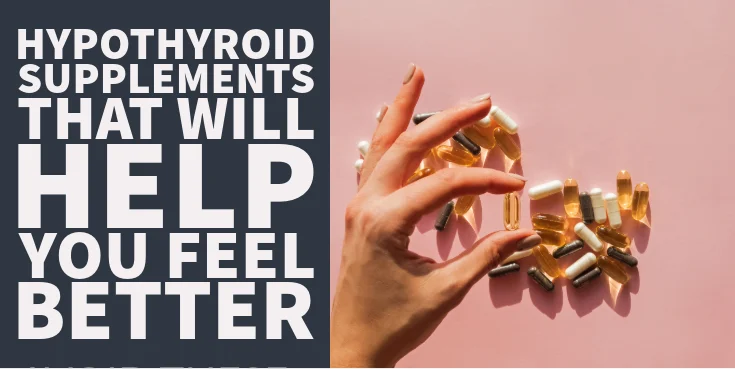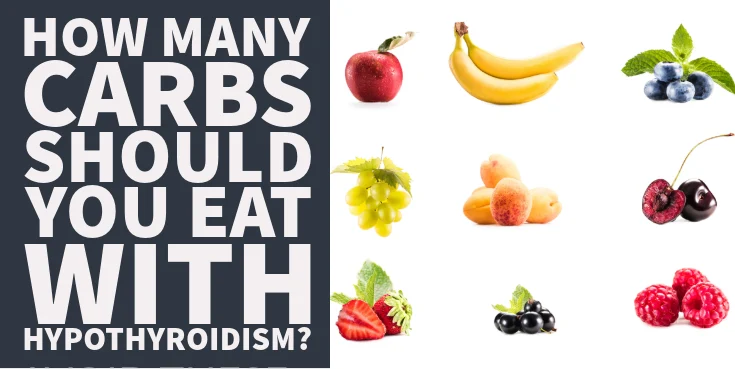Contrary to what your doctor might tell you, hypothyroid support supplements can absolutely help you feel better.
You don’t need to take my word for it either. There are literally thousands of people who take them every single month.
And these people wouldn’t continue to buy them and spend their hard-earned money if they didn’t do anything.
Getting results when taking thyroid support supplements is all about having the right expectations and using the right supplements.
If you think that taking a few supplements is going to completely negate your need for thyroid medication then think again.
While powerful, thyroid supplements act as a supplemental therapy to what you are already doing but they don’t take the place of thyroid medications or the need to alter your lifestyle.
But don’t get confused in thinking they aren’t powerful just because they won’t replace your thyroid medication.
When the right ones are used, thyroid patients report seeing improvement in major thyroid-related symptoms like fatigue, weight gain, hair loss, and more.
Which ones can you get these kinds of results? That’s exactly what we are going to be talking about starting right now:
Let’s jump into the top 6 best supplements to use if you have hypothyroidism from any cause including hypothyroidism, Hashimoto’s, thyroid removal, or RAI starting with #1 guggulsterone.
DOWNLOAD FREE RESOURCES
Foods to Avoid if you Have Thyroid Problems:
I’ve found that these 10 foods cause the most problems for thyroid patients. Learn which foods you should avoid if you have thyroid disease of any type.
The Complete List of Thyroid Lab tests:
The list includes optimal ranges, normal ranges, and the complete list of tests you need to diagnose and manage thyroid disease correctly!
#1. Guggulsterone
Guggulsterone is the beneficial plant compound that comes from the guggul tree and it’s been used for thousands of years in Ayurvedic medicine.
Traditionally, it was used to treat conditions like high cholesterol, weight gain, acne, and other inflammatory conditions (1) but newer studies have also shown that it may have an impact on thyroid function as well.
For instance, one study showed that guggul completely reversed induced hypothyroidism in mice (2).
And another showed that its use increases iodine uptake into the thyroid gland and the activation of thyroid peroxidase which promotes thyroid hormone production (3).
These are not human studies, but I can tell you from my own experience that guggul extract does seem to benefit many hypothyroid patients which is why I’ve included it in my T3 Conversion Booster formulation.
But even if we assume that the animal studies aren’t indicative of what would happen if humans took it, there’s still good reason to consider using this ingredient as a thyroid patient:
And that’s because its other documented benefits still directly target many of the symptoms caused by the low thyroid state including high cholesterol.
On top of this, its anti-inflammatory benefits will still be helpful for just about any thyroid condition but especially the inflammatory mediated conditions like Hashimoto’s.
If you want to supplement with guggulsterone then look for a supplement that has guggul extract with a dose of around 500 mg per serving.
#2. T2
T2 is an actual thyroid hormone and the only one, in fact, that is available over the counter.
While technically not as powerful of a thyroid hormone as T3, T2 still plays an important role in the body where it helps regulate metabolism, cholesterol, and fat tissue (4).
Each thyroid hormone performs a slightly different action.
T4, for instance, primarily exists as a reservoir for T3 production.
T3, on the other hand, does all of the work at the thyroid hormone receptor.
T2, not only has its own specific functions on certain tissues but it also seems to a some role in stabilizing T3 and T2 levels and enhancing T3’s activity on the thyroid hormone nuclear receptor.
Why does T2 benefit patients with hypothyroidism?
Because you can’t forget that thyroid hormones are created from one another and if you don’t have enough of any of the higher-level thyroid hormones (like T4 or T3), you are very likely to be deficient in the lower-level thyroid hormones like T2 and T1.
Taking extra T2 if you have hypothyroidism allows you to more closely mimic the thyroid hormone production of a healthy thyroid gland and is one of the main reasons that I love recommending it.
If you want to supplement with T2 thyroid hormone then look for a supplement that contains active T2 as 3,5 diiodo-l-thyronine at 100 mcg per serving.
#3. Rhodiola
Adaptogenic herbs are incredibly popular among thyroid patients and for good reason:
They help to naturally balance cortisol.
Cortisol, of course, is the stress hormone produced by your adrenal glands during times of stress.
And thyroid patients, owing to the impact that thyroid hormone has on multiple systems in the body, are more susceptible to stress and its impact on cortisol.
In other words, as a thyroid patient, your cortisol level will be much less stable than someone with a healthy thyroid gland.
This is at least one of the main reasons that thyroid patients frequently suffer from issues such as fatigue, insomnia, and insulin resistance.
Rhodiola is one of many adaptogenic herbs that treat these issues (5) and bring balance back to cortisol by increasing how resilient your body is to stress.

It can’t take away your stress, but what it can do is limit the negative impact that stress has on your body.
Rhodiola happens to be one of my preferred adaptogens for thyroid patients because I’ve found it to be more stimulatory compared to other types such as ashwagandha.
But don’t get me wrong, ashwagandha is still a great option for thyroid patients so don’t be afraid to try different adaptogens until you find what works best for you.
You can support adrenal function with rhodiola (and other cortisol-supporting ingredients) here.
#4. Calcium D glucarate
Your liver is one of the most important organs when it comes to thyroid function.
It not only is the site of roughly 80% of T3 to T3 conversion, but it’s also the organ primarily responsible for breaking down harmful products that would otherwise cause harm to the body.
If your liver is compromised, its ability to perform these functions will be impaired.
You might not think that’s a problem because, after all, isn’t it obvious if you have a liver problem?
The answer is no.
The most common cause of liver dysfunction is fatty liver disease and the most common symptom of fatty liver disease is nothing.
Most people who have a fatty liver have no idea that they do and this includes thyroid patients.
So you may be running around completely unaware that your liver is impaired and that it is negatively impacting your thyroid.
This is exactly why I’ve included calcium d glucarate on this list.
While it doesn’t support your thyroid gland directly, it does support thyroid function by impacting the organ most responsible for regulating thyroid hormones.
Calcium D glucarate is a calcium salt of a naturally occurring compound called glucaric acid that you would normally get from fruits and vegetables (6).
You can’t take glucaric acid as a supplement but you can take calcium d glucarate which provides your liver with a concentrated dose of this beneficial compound.
If you want to get technical, it inhibits beta-glucuronidase which is involved in the phase II detoxification pathway in the liver.
Put in simple terms, it helps your body eliminate harmful compounds like endocrine-disrupting chemicals.
On top of the elimination of harmful compounds, it also supports the metabolism of estrogen.
Thyroid patients, who suffer from the inability to sweat are more prone to the build-up of endocrine disruptors.
They also happen to frequently suffer from an imbalance of progesterone to estrogen, in favor of estrogen.
Taking calcium d glucarate helps with both conditions which is why it’s often used to support liver health but also to treat conditions related to estrogen dominance.
Dosing for calcium d glucarate ranges from 250 mg to 1,000 mg taken each day.
#5. L-tyrosine
Next on the list is L-tyrosine.
Tyrosine is a non-essential amino acid that your body uses as a precursor to create multiple hormones including dopamine, epinephrine, and thyroxine.
Thyroxine, also known as T4, is the most abundant thyroid hormone in the body.
Without tyrosine, your body would be unable to create these hormones, including T4.
The reality is, though, that most people don’t have an issue with tyrosine intake.
In fact, tyrosine deficiencies are incredibly rare outside of a few genetic diseases.
But what’s interesting is that people who take l-tyrosine, even though they aren’t deficient, often see big symptomatic improvements, usually in the form of better cognition and more energy (7).
So even though you may not truly be deficient in l-tyrosine, doesn’t mean you won’t benefit from taking it.
Given its stimulatory nature, remember: your body uses it to create adrenaline, you don’t really need that much of it.
And some people tend to be very sensitive to it which is why I think lower doses are best for thyroid patients.
Doses in the range of 100 to 200 mg per day usually do the trick.
#6. Inositol
Inositol is a sugar-like compound involved in regulating thyroid function in several ways.
It’s often found in supplements as myoinositol which is the most abundant stereoisomer of the inositol family.
How it impacts thyroid physiology is fairly complicated but you can think of it like this:
Inositol is used by your cells to augment the downstream effects of TSH receptor activation by acting as a secondary messenger (8).
In essence, it’s acting as a megaphone for the cellular effects of TSH.
While that may not seem like a big deal, it actually is, and we have several research studies to prove it.
Here are a few to drive this point home:
In patients with subclinical hypothyroidism, the combination of myoinositol plus selenium resulted in a decrease in TSH by 21% over 3 months and that benefit continued to improve over the course of a year (9).
In PCOS patients, the combination of myoinositol plus metformin resulted in a significant decrease in TSH compared to just metformin alone (10).
And, finally, in patients with Hashimoto’s, the use of selenium plus myoinositol resulted in improvements in all thyroid lab tests including thyroid antibodies (11).
Final Thoughts
Will taking these thyroid support supplements replace your need for thyroid medication?
Probably not.
But can they help you better control your symptoms and augment the effects of what you’re already doing?
Absolutely.
I’m obviously biased because I formulate and sell thyroid support supplements, but I’d be lying if I said I didn’t believe that they have the potential to help most (or all) thyroid patients.
This doesn’t mean you have to take them to feel better, but with their documented benefits in multiple tissues in the body and plenty of research to support their use, it often makes sense to at least give them a try.
Now I want to hear from you:
Have you tried any of the thyroid support supplements on this list?
If so, which ones?
Did they work for you? Did you notice a change in your symptoms when using them?
Are you planning on giving any a try?
Leave your questions or comments below!
Scientific References
#1. pubmed.ncbi.nlm.nih.gov/18078436/
#2. pubmed.ncbi.nlm.nih.gov/15798994/
#3. pubmed.ncbi.nlm.nih.gov/17340256/
#4. ncbi.nlm.nih.gov/pmc/articles/PMC9322486/
#5. ncbi.nlm.nih.gov/pmc/articles/PMC9657580/
#6. pubmed.ncbi.nlm.nih.gov/12197785/
#7. pubmed.ncbi.nlm.nih.gov/26424423/
#8. ncbi.nlm.nih.gov/pmc/articles/PMC8143049/
#9. ncbi.nlm.nih.gov/pmc/articles/PMC9709133/
#10. pubmed.ncbi.nlm.nih.gov/23957782/
#11. ncbi.nlm.nih.gov/pmc/articles/PMC5331475/










Your articles are mind blowing and so interesting! I’m going to try some of these supplements. I’ve tried calcium D glucarate before, but will try again with these others! Thank you!
Hi Shari,
Glad to hear it! Thanks for sharing.
If bad cholestrol levels tends to be higher in hashimotos thyroid patients, what supplements best help to lower cholesterol, esp when related to higher estrogen levels and near zero progesterone? Ive been fighting this problem for years. Docs want me to go on statins but i am not convinced this is the right path for me.
Hi Marie,
If your high cholesterol is primarily related to your thyroid then supporting its function may reduce your cholesterol. It’s typically not the case, though, that a dysfunctional thyroid is the only thing contributing to an elevated cholesterol which is why lifestyle changes tend to be the best first line treatment for this condition. You can certainly combine thyroid support supplements with these lifestyle changes if you’d like, but I wouldn’t forgo lifestyle changes in favor of supplements.